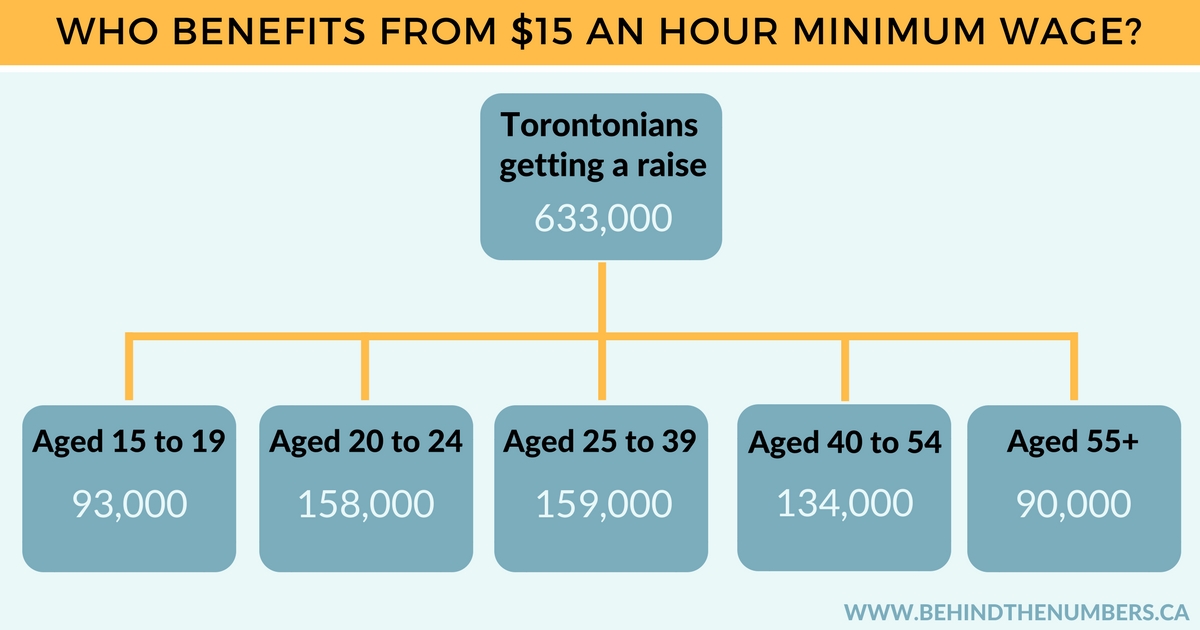Ontario’s big business lobbies continue their campaign against the government’s planned minimum wage hike—to $15 an hour by January 1, 2019 from the current rate of $11.40. They say the move is “arbitrary” and are threatening to flee the province unless the government backs down.
This kind of rhetoric was predictable and should be faced down as the empty threat that it is. At the end of the day, business will adjust and, as I presented in my report Ontario Needs a Raise, a quarter of Ontarians will get a badly needed and long overdue raise.
Who benefits from $15 an hour?
According to Statistics Canada’s Labour Force Survey (and my calculations), 633,000 Ontarians earning less than $15 an hour live in Toronto. A majority are over 25 (60%) and about 90,000 are seniors; 58% are women, and 113,000 are recent immigrants. Among the beneficiaries of a $15 minimum wage are 126,000 Torontonians with children under 18.

Source: Labour Force Survey and author’s calculations.
A Torontonian working full time for a minimum wage beginning January 2019 would make $30,000 a year. Even those who don’t work full time may be pulled above the poverty line for the first time thanks to the pay increase. And among the more precariously employed, 270,000 part-time workers (57% of all part-timers in the city) will see a raise.In comparison, Toronto’s richest have been enjoying hefty annual pay increases recently. In the past year of data (to 2014), Toronto’s richest 1% got a raise of $62,000, with their pre-tax market earnings (including capital gains) rising from $731,000 to $793,000.
In other words, Toronto’s richest 1% made double in raises in one year what a $15-an-hour worker will make from a full year of full-time work. At least a few of these wealthy Torontonians will be the owners and managers of the businesses currently lobbying against the provincial government’s minimum wage hike.
Where do they work?
Torontonians getting a raise are concentrated in three industries: 170,000 work in retail, 112,000 work in accommodations/food services, and 60,000 work in the cleaning, security, call centre or waste collection sector. These jobs cannot be outsourced overseas—a fact that helps us call the big business bluff about skipping town.
Torontonians getting a raise also overwhelmingly work for big box stores and chain restaurants, not mom-and-pop shops. In the three sectors mentioned above, 54% of workers getting a raise work for big businesses with over 500 employees.
At the end of the day, all Torontonians, rich and not-so-rich, workers and employers, will benefit from the $15 minimum wage.
This blog is part of a series that examines who will benefit from a proposed move to $15 an hour minimum wage in Ontario. For a look at why the raise is good for Ontario workers, read CCPA Ontario director Trish Hennessy's take here. Data on how $15 minimum wage would benefit Ontario's Indigenous workers and families can be found here. Hamilton-specific calculations are available online here.
David Macdonald is a senior economist with the Canadian Centre for Policy Alternatives. Follow him on Twitter @DavicMacCnd.






